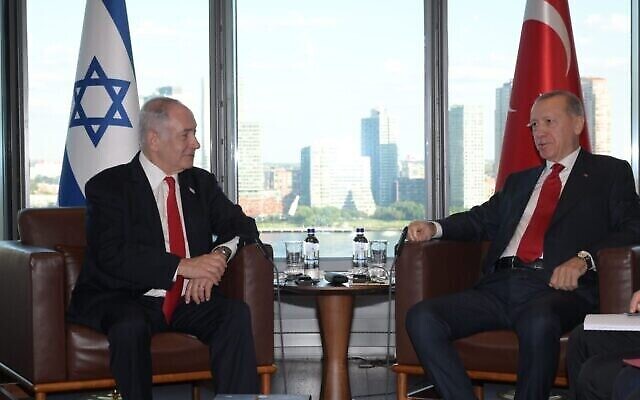Turkey severs ties with Israel

Arab ‘normalisers’ should follow Erdoğan’s lead before it is too late
Turkish President Recep Tayyip Erdoğan’s announcement on Wednesday that Turkey has severed all ties with Israel, will not continue to develop relations, and “will maintain this stance in the future as well”, is historic and unprecedented.
This courageous stand by one of the world’s most important Islamic countries — and a NATO member — is doubly important because it was coupled with a strongly expressed desire to restore relations with Syria.
“I am still optimistic about (President Bashar) Asad. I still hope we will be able to meet and put Syrian-Turkish relations back on the right track,” Erdoğan told journalists accompanying him on his flight home from the Arab-Islamic summit in Riyadh and the COP29 climate talks in Baku. “We have held out our hand for normalisation with Syria because that will open the door to peace and stability in Syria’s territory.”
Erdoğan had taken strong verbal stands against the occupation state since the start of its assaults on Gaza and Lebanon and been fiercely critical of Benjamin Netanyahu and his genocidal policies. He eventually decided to halt all trade with it despite his country’s tough economic circumstances and strong pressure from Israel’s US and European allies. But he was strongly criticised both at home and abroad for failing to close loopholes in the trade ban and maintaining diplomatic relations with Tel Aviv.
He has now delivered a powerful and resolute response to his critics.
Israeli is suspected of being behind many recent terrorist actions in Turkey, including the recent attack on the Bayrakdar drone plan near Ankara. It has also been backing schemes to dismember Turkey and establish a ‘Greater Kurdistan’, and to sabotage promising peace talks with the jailed leader of the separatist rebel Kurdistan Workers Party(PKK) Abdullah Ocalan.
Notably, Erdoğan took a significant step towards meeting the Syrian government’s key conditions for restoring relations and normalising ties: the withdrawal of all Turkish forces from Syrian territory. In the same airborne press briefing, he strongly upheld Syria’s territorial integrity and insisted it was not being threatened by Syrians based in various countries — a reference to the Turkish-backed opposition and its armed formations. He went on to appeal to Asad to “appreciate this, and take the necessary steps to create a good climate in his country.”
Erdoğan’s break with Israel and outreach to Syria puts to shame the Arab countries — specifically Egypt Jordan, the UAE, Morocco, and Bahrain — whose governments have rushed to normalise relations with the occupation state and maintained silence or ‘neutrality’ over its murderous aggression, without taking a single step, small or large, to demonstrate solidarity or support for the Palestinian and Lebanese people.
The Turkish president has set them an example and taken a lead they would be well advised to follow before it is too late.
It may be premature to speculate what Asad’s response will be to this Turkish act of solidarity with the Axis of Resistance, the Palestinian cause, and the resistance fighters who have confounded the Israeli army and shattered its myth of omnipotence. But it certainly will not be negative.
The Turkish and Syrian sides reverting to the historic 1998 Adana treaty, with Russian sponsorship and guarantees, remains the quickest route to restoring and developing relations and putting behind all previous mistakes and obstacles.
 TheAltWorld
TheAltWorld 
0 thoughts on “Turkey severs ties with Israel”